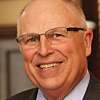Breakout Sessions (Saturday)
Read about our Plenary Sessions and speakers.
View the video presentations from the event, which occurred April 1–2, 2011.
Morning Sessions
Chocolate, Social Responsibility,
and Fair Trade
Speaker
Chocolate is a universally loved product that has been around for centuries. Although some of the well-known chocolate companies were pioneers of “social responsibility” in the late 19th and early 20th centuries, many are now lagging in that arena. However, there is a new breed of chocolate companies that are making their chocolate within a socially responsible and fairly traded business model.
The chocolate (and other products) we as consumers choose to buy, and the companies we buy from, can make a difference in shaping the world we live in. This session will examine a company that firmly believes that creating economic and social value are not mutually exclusive, and that a business is most successful when it is achieving both, and offering consumers the opportunity to participate in their mission.
Showcasing Products From Developing Countries
How Large Retailers Impact Global Poverty
Speaker
Large retailers sell many bulk products — such as clothing and shoes — that originate in developing-country factories. In contrast, a few small, “fair trade” stores sell specialty goods made by artisans from the same parts of the world. Can large retailers profitably emulate the principles, practices, and impact of these specialty stores — but at a much larger scale?
This session will focus on the stories of two Seattle-based companies and the unique partnerships they are involved in to address poverty in an economically sustainable manner through showcasing specialty goods from the developing world.
Faith, Business, and Human Flourishing
Panelists
 Bob Lonac, president and CEO, CRISTA Ministries
Bob Lonac, president and CEO, CRISTA Ministries

Jacinta Tegman, director of fund development, Crista Ministries
This session is geared toward entrepreneurs and executives who seek guidance on how faith —focused on the Christian tradition, but open to all who are interested — influences the conduct of business, especially as it affects poor and vulnerable people.
For example, job creation adds social value, but it may just be a place to start. Employees, their families, and their communities flourish when business leaders become servant-leaders who recognize employees as "whole persons" and create organizational cultures that serve and empower them.
In this session we will also explore infrequently addressed topics, such as the role of profit, how it's ultimately used, and how to create metrics for multiple bottom lines.
Business Legal Structures and
Your Values
An Overview of the Advantages and Restrictions of
For-profit, Nonprofit, B-Corps, L3Cs, and Hybrid Entities
Panelists
A panel with the co-founder of Pura Vida Coffee, a pioneering social enterprise recently profiled in The New York Times and Harvard Business Review, this session includes a review of legal structures for social ventures (Benefit Corporations, L3Cs & Hybrids) with two plain-speaking attorneys and one experienced social entrepreneur. Anyone interested in learning how to maintain mission along with profitability should consider attending this session.
A View From Europe: Big Business for the Bottom Billions
Speaker
 Peter Heslam, director, Transforming Business (University of Cambridge)
Peter Heslam, director, Transforming Business (University of Cambridge)
As a Brit leading a unique project at the University of Cambridge, Peter Heslam will take session participants on an inspirational "tour" of some of the big global brands that are significant to the themes of the conference.
This session will highlight the rich traditions and commitments behind multinationals such as Cadbury, Marks and Spencer, Barclays, Boots, Guinness and Unilever. Their founding visions have gathered dust in the marketplace of ideas. Are they poised for rediscovery in humanity's quest for a better future? Come find out.
Afternoon Sessions
The Ethical Sourcing of Some of Our Favorite Products
Panelists
Danielle Harder, senior manager, social and environmental accountability, Microsoft Xbox
Living wages ... humane working conditions ... no child or slave labor ... environmentally sustainable. These are some of the business practices that an increasing number of consumers expect for how their products are produced. But what are companies actually doing to ensure that these labels are more than just empty rhetoric?
This session will explore how businesses are raising standards and verifying the conditions of the global supply chains of some of our favorite product.
Small-scale Consumer Energy Business in Developing Countries
Improving Health, Economic Well-Being, and Environmental Sustainability
Panelists
 Jill Bamburg, dean of academic affairs, Bainbridge Graduate Institute
Jill Bamburg, dean of academic affairs, Bainbridge Graduate Institute
Consistent, reliable, and affordable access to clean energy is an often-missing key to surmounting many development issues – from health to environment to economic growth.
This session will focus on the stories of innovative small companies that are overcoming challenges to create profitable, economically sustainable businesses to address this current gap. Whether it’s by delivering fuel, providing efficient-energy products (e.g., cook stoves), or selling certifiable credits on the carbon market, these companies are creating business solutions based on available resources and customer demand.
Microfinance: New Business Models
New Business Models for Meeting Client (and Customer) Needs
Panelists
 Brigit Helms
, senior expert for financial inclusion, McKinsey & Company
Brigit Helms
, senior expert for financial inclusion, McKinsey & Company
 Elisa Murray, director of communications, Global Partnerships
Elisa Murray, director of communications, Global Partnerships
Microfinance is perhaps the best-known, market-oriented approach to alleviating poverty. Many people are aware of the “credit” (small loans) part of its story. But the true scope of microfinance involves so much more.
This session will focus on emerging models and services that aim to serve a broader spectrum of client needs.
Tackling Corruption, Tackling Poverty
Ethical Business as a Key to Reducing Poverty and
Broadening Economic Opportunity
Speaker
Well-functioning markets are a key to facilitating the economic growth necessary to pull large numbers of people out of poverty. Yet huge barriers to development in the form of corruption exist in some of the very places that need economic opportunity the most. A well-known "corruption" index even correlates higher levels of corruption with lower levels of economic development within a country. The ethical business leader is faced with two options: not doing business in such places, or finding a way to navigate these difficult waters in a way that models their core values, acknowledges the laws (of both the host and home countries), and leads to change.
In this session we'll discuss these difficult options, and offer some directions for dealing with them.



















